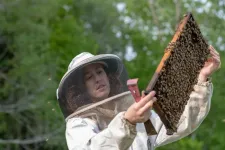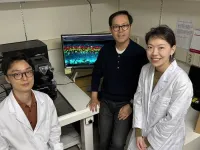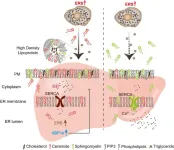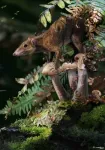(Press-News.org) EMBARGOED UNTIL 09:00 BST WEDNESDAY 2 APRIL
Tinker Tots: A Citizen Science Project to Explore Ethical Dilemmas in Embryo Selection
Researchers at the University of Oxford, University of Exeter, and the National University of Singapore Yong Loo Lin School of Medicine present a new, interactive study.
Oxford, 2 April 2025: When choosing an embryo for implantation during in vitro fertilization (IVF), would you consider its chances of developing a health condition? What about traits like creativity, intelligence, or physical fitness? Tinker Tots is an interactive research project designed to explore how people make these difficult choices. By taking part, you help researchers understand how different genetic possibilities influence decision-making—while also gaining insight into your own and other people’s values.
Understanding Decision-Making in Embryo Selection
Advances in preimplantation genetic testing (PGT) now allow parents undergoing in vitro fertilization (IVF) to receive probabilistic information about an embryo’s likelihood of developing certain traits and medical conditions. This technology raises important questions: How do people interpret and use this information? What traits or risks do they prioritise? How do ethical, social, and personal factors shape these choices?
To answer these questions, researchers from the University of Oxford, University of Exeter, and the National University of Singapore Yong Loo Lin School of Medicine have developed Tinker Tots. In this online study, participants are presented with hypothetical embryo selection scenarios. Each embryo has a unique genetic profile, with different chances of developing certain conditions (e.g., heart disease, schizophrenia) or traits (e.g., high IQ, musical talent). Participants must decide which embryo they would choose to implant, helping researchers uncover underlying patterns in human values and decision-making.
“This is a study about what people think is good in life and what they value in their children. It will inform medical research, the regulation of reproduction and the choices people have when deciding to bring a child into the world.” - Prof. Julian Savulescu, a Principal Investigator of the project.
A Thought-Provoking Experience
Tinker Tots is open to anyone. Some may see it as an opportunity to reflect on their values. Others may be interested in the science behind genetic selection. Whatever the motivation, every choice made in the study helps researchers understand how people evaluate genetic information when faced with real-world trade-offs.
“Tinker Tots is designed as a tool for scientific research and for people to engage with important ethical questions in an accessible and thought-provoking way.” - Dr. Edmond Awad, Lead Researcher of the project
How It Works
???? Make choices – Users navigate rounds of embryo selection dilemmas, choosing between embryos with different predicted attributes.
???? Compare probabilities – Each round presents hypothetical genetic probabilities, prompting users to weigh and prioritise traits and conditions.
???? Reflect on values – At the end of each session, users receive a summary of their choices and what other people have chosen, offering insights into their preferences and decision-making patterns.
???? Explore further – Users can play multiple sessions to see how their choices evolve when faced with new attributes.
???? Contribute to research – Every decision made helps researchers better understand how people interpret genetic information and make ethical trade-offs.
Join the Study
Tinker Tots is part of the ANTITHESES Discovery Research Platform for Transformative Inclusivity in Ethics and Humanities Research funded by the Wellcome Trust [226801]. It is open to all participants willing to explore how we weigh probabilities, risks, and values when shaping future generations.
Try it now: Tinker Tots
Notes to Editors
For media inquiries, please contact: tinker-tots-contact@uehiro.ox.ac.uk
Images are available here (Credit: Tinker Tots): https://www.dropbox.com/scl/fo/qumsp8q5adh122gt9bdri/AAWUL3-d61Q6mgYrSaPQjHI?rlkey=lic7j5looh42gq79ktaftbdrp&dl=0
END
Tinker Tots: A citizen science project to explore ethical dilemmas in embryo selection
2025-04-02
ELSE PRESS RELEASES FROM THIS DATE:
Sensing sickness
2025-04-02
Beekeepers in the United States lost more than 55 percent of managed colonies last year—the highest loss rate since the Apiary Inspectors of America began determining them in 2011. A new study from University of Vermont scientists and international collaborators supports a novel method for testing hygienic behavior in honey bees that could promote breeding more disease resistant colonies in the future.
“Beekeepers are losing bees at a rate that they say is unsustainable,” says Samantha Alger, director of the Vermont Bee Lab at the UVM and lead author of the study. “In the ‘80s, beekeepers lost colonies ...
Cost to build multifamily housing in California more than twice as high as in Texas
2025-04-02
Building multifamily housing in California is more than twice as expensive as it is in Texas, with much of the difference driven by state and local policies that contribute to long permitting and construction timelines, and higher local development fees, according to a new RAND report based on cost information from more than 100 completed apartment projects.
The high cost of housing and its associated effect on homelessness is a defining policy issue in California.
The cost of building multifamily housing is 2.3 times higher in California than Texas and 1.5 times higher than in Colorado, ...
Program takes aim at drinking, unsafe sex, and sexual assault on college campuses
2025-04-02
PISCATAWAY, NJ – A prevention program that teaches college students about the links between risky drinking and sexual assault—and how to protect themselves and their friends—has shown early promise, according to a new report in the Journal of Studies on Alcohol and Drugs.
It’s well known that alcohol and sex can sometimes be a dangerous mix for young adults. Alcohol intoxication raises the odds of having unprotected sex and, possibly, contracting a sexually transmitted disease or having an unplanned pregnancy. Drinking can also increase the risk of falling victim to sexual assault or becoming the perpetrator.
Yet college prevention programs have traditionally ...
Inability to pay for healthcare reaches record high in U.S.
2025-04-02
WASHINGTON, D.C. – April 2, 2025 – The inability to pay for healthcare in the U.S. has reached a new high, with more than one-third of Americans (35%), or an estimated 91 million people, reporting that they could not access quality healthcare if they needed it today, according to the latest West Health-Gallup Healthcare Affordability Index. The Index has been tracking healthcare affordability and access in the U.S. since 2021.
Rates were higher among Black and Hispanic Americans, with 46% and 52%, respectively, reporting ...
Science ‘storytelling’ urgently needed amid climate and biodiversity crisis
2025-04-02
Scientists should experiment with creative ways of communicating their work to inspire action to protect the natural world, researchers say.
Scientists primarily publish their work in academic journals, where writing is expected to be technical, objective and dispassionate – making it unlikely to appeal to, or be easily understood by non-experts.
The researchers – from the University of Exeter – argue for science “translated into stories”, with benefits both for science and wider society.
They suggest ways that scientists can tell powerful, passionate stories without compromising the objectivity of science.
“As ...
KAIST Develops Retinal Therapy to Restore Lost Vision
2025-04-02
Vision is one of the most crucial human senses, yet over 300 million people worldwide are at risk of vision loss due to various retinal diseases. While recent advancements in retinal disease treatments have successfully slowed disease progression, no effective therapy has been developed to restore already lost vision—until now. KAIST researchers have successfully developed a novel drug to restore vision.
< Photo 1. (From left) Ph.D. candidate Museong Kim, Professor ...
Adipocyte-hepatocyte signaling mechanism uncovered in endoplasmic reticulum stress response
2025-04-02
The endoplasmic reticulum (ER) is the portion of the cell responsible for manufacturing and folding proteins. Proteins are essential for a wide range of cellular functions—as enzymes, transporters, hormones, antibodies, receptors, and more. They must be folded into the correct three-dimensional shape to function properly. If the ER is unable to manufacture or fold proteins correctly, the cell develops ER stress, which activates the unfolded protein response (UPR)—a protective mechanism aimed at restoring cellular function.
While UPR begins ...
Mammals were adapting from life in the trees to living on the ground before dinosaur-killing asteroid
2025-04-02
More mammals were living on the ground several million years before the mass extinction event that wiped out the dinosaurs, new research led by the University of Bristol has revealed.
The study, published today in the journal Palaeontology, provides fresh evidence that many mammals were already shifting toward a more ground-based lifestyle leading up to the asteroid’s impact.
By analysing small-fossilised bone fragments, specifically end of limb bones, from marsupial and placental mammals found in Western North America - the only place with a well-preserved terrestrial fossil record from this time – the team discovered signs that ...
Low LDL cholesterol levels linked to reduced risk of dementia
2025-04-01
People with low levels of low-density lipoprotein cholesterol (LDL-C) in their blood have a lower risk of dementia, including lower risk of Alzheimer’s disease related dementia, shows a study published online today in the Journal of Neurology Neurosurgery & Psychiatry.
Use of statins conveyed an additional protective effect for people with low LDL-C, specifically those with blood levels less than 1.8 mmol/L (<70 mg/dL), reducing their risk of dementia even further.
However, reducing LDL-C ...
Thickening of the eye’s retina associated with greater risk and severity of postoperative delirium in older patients
2025-04-01
Thickening of the macular layer of the eye’s retina is associated with a greater risk of postoperative delirium for older patients undergoing surgery under general anaesthetic, reveals a study published online in the open access journal General Psychiatry.
Postoperative delirium is one of the most common complications for older patients after surgery and can have profound implications for long-term health and wellbeing.
Patients with postoperative delirium require longer hospital stays and are more likely to require support at home to help with daily tasks such as washing, dressing, and eating or be discharged ...





